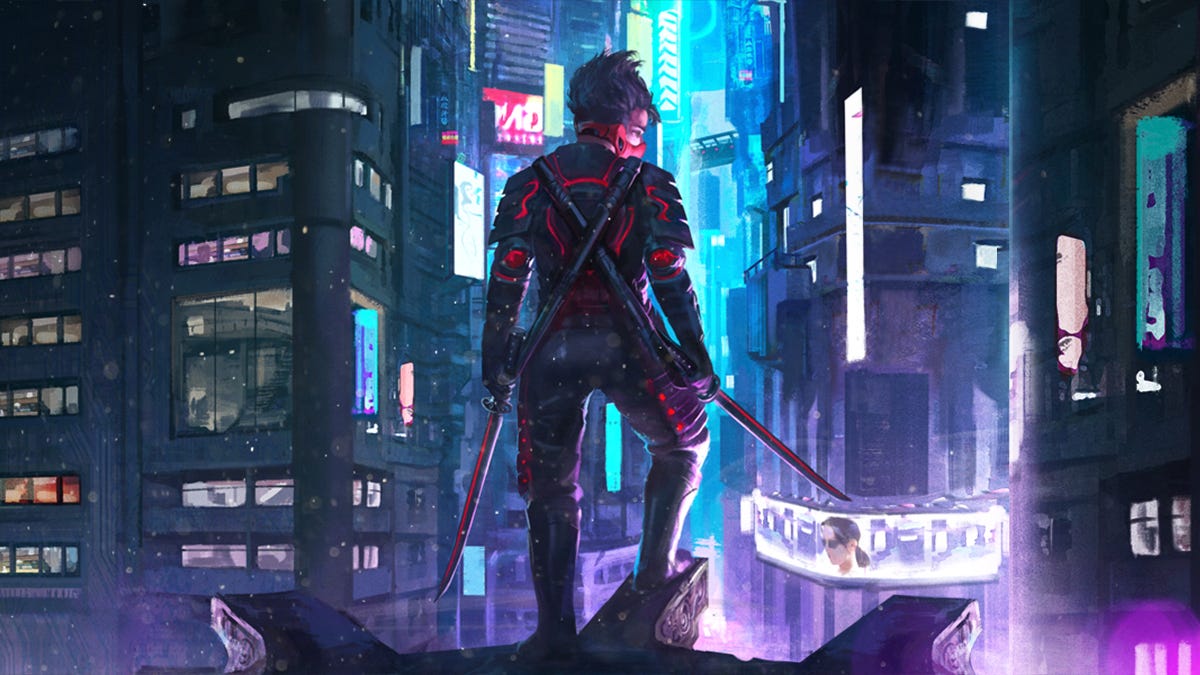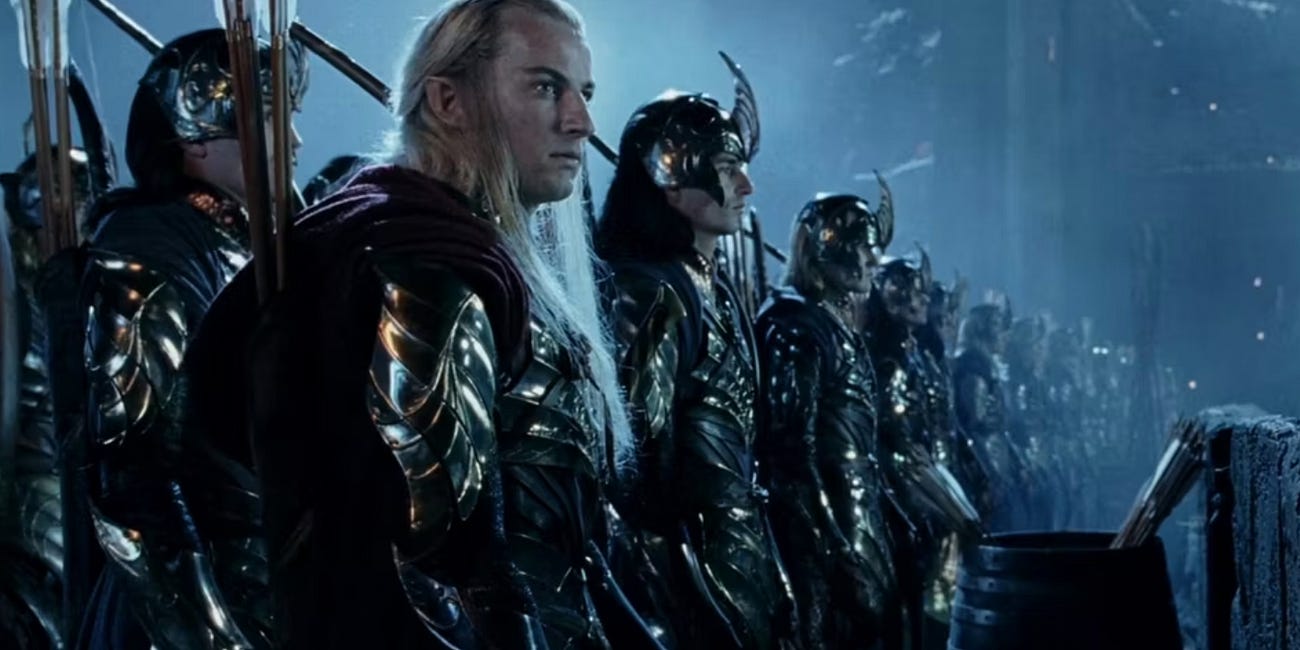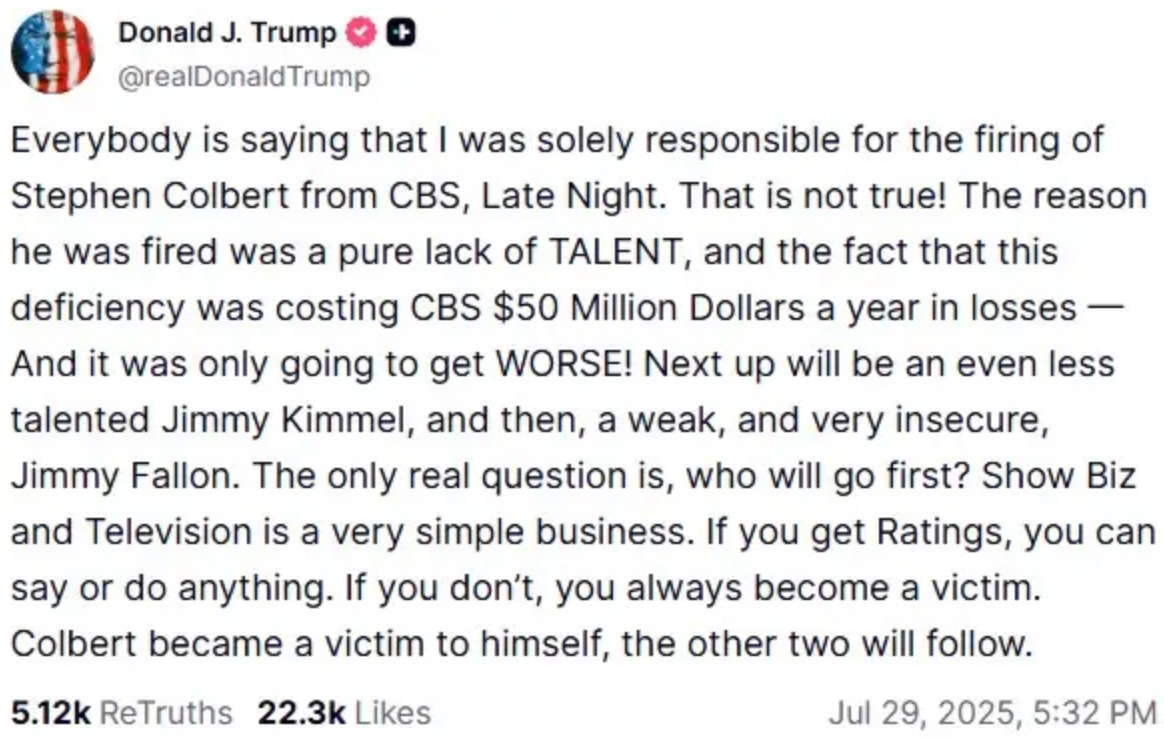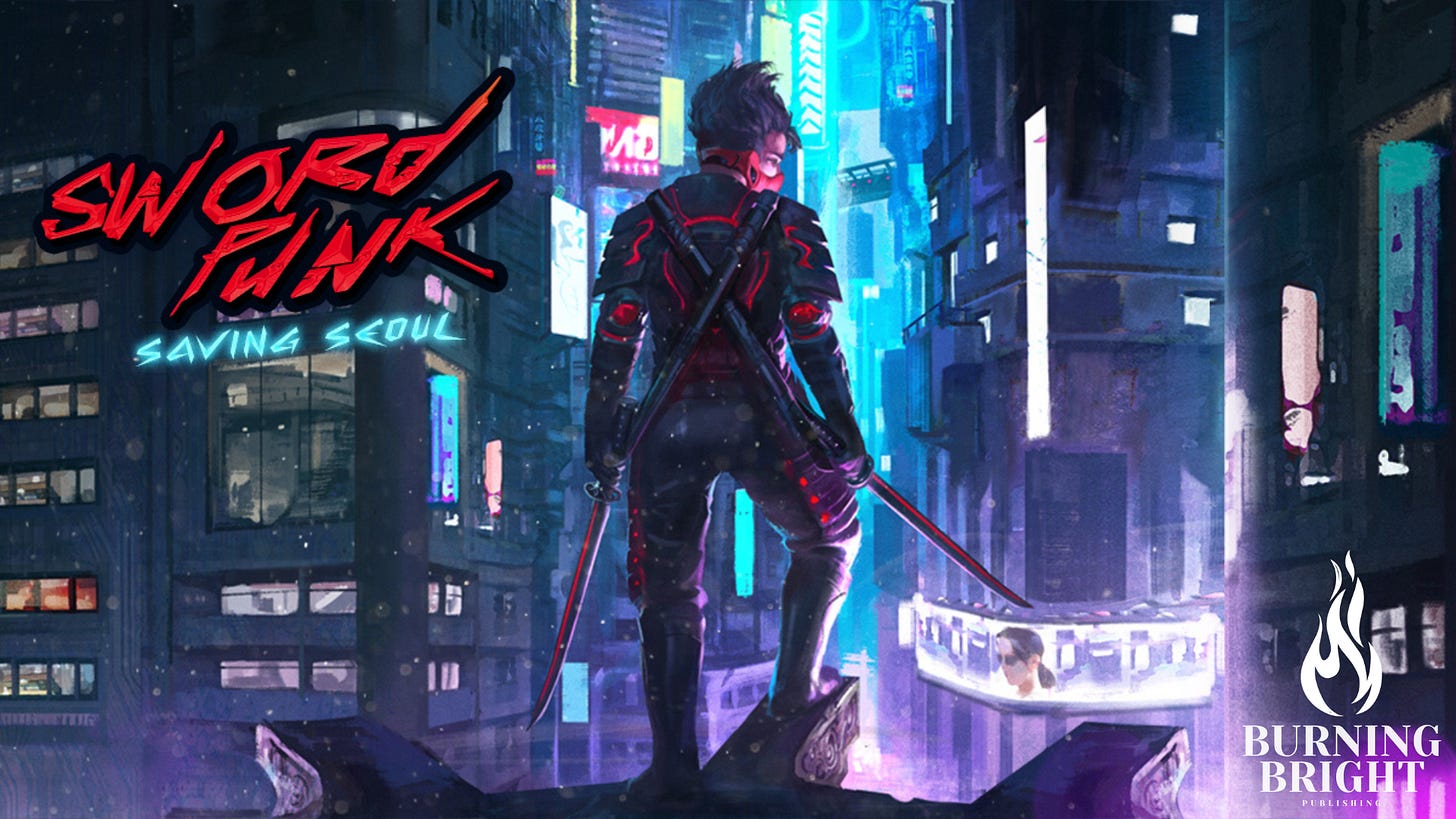Take it Back
Winning the War … One Story at a Time
While support for this free publication in the form of Paid Subscriptions (cancel at any time) and one-time Coffee Donations continue to be vital for this writer and his budding family, this feature marks bold new territory for Burning Bright, and it’s something I’ve been hinting at for some time.
For years, many of my long-time readers and my most loyal supporters have been inquiring as to the fate of the genre fiction I previously published under my birth name.
Well, I’m both excited and nervous to announce that I’ve just launched my own independent publishing house, and with your support, hope to make a splash with it.
To read more about it, to support my new venture and to scoop up a pretty cool collector’s item (not to mention story) at the same time, find links at the bottom of this piece.
And yes, I did actually write an original feature in keeping with the theme of themes around these parts, so as not to waste your time, so I hope you enjoy a slight break from the purely political, whether you end up supporting the new venture or not.
Now … on to the writing.
We’re in a War of Stories.
It’s a statement I’ve been repeating ad nauseum since I forged this name atop the one I was born with, and if that refrain has begun to echo through the corridors of the Collective American Mind like a persistent motif in a grand, unfolding epic, it’s because the battlefield itself demands repetition, reinforcement, and relentless recognition.
Stories aren’t mere diversions; they’re the psychic scaffolding upon which societies build their self-conception, the archetypes that encode truths deeper than facts, and the narratives that either liberate or enslave the human spirit.
In the American psyche, entertainment—fiction, film, television, the flickering glow of Hollywood’s once-mighty dream machine—has long served as the primary vessel for these stories, shaping not just our leisure, but our very understanding of heroism, villainy, triumph, and tragedy.
Culture, from where I’m standing is the story a society tells itself about itself, a macro mirror that reflects, distorts, or shatters the collective soul.
And no one understands this better than Donald J. Trump, the ultimate cypher in the modern American saga, a man who wields narrative like a weapon, inverting the enemy’s own deployments against them in a Reverse Hegelian Dialectic that turns problem into absolution.
As I’ve explored before, in the shadows of the Info War, Trump isn’t just a political figure; he’s a narrative fighter par excellence, provoking change within the observer—the voter, the citizen, the awakening mind—by harnessing the raw power of story to expose the System of Systems. He knows that culture isn’t downstream from politics; it’s the riverbed itself, the foundational terrain where archetypes take root and flourish or wither under subversion.
Trump, ever the showman, the builder of brands and breaker of illusions, grasps that entertainment isn’t frivolous escapism, but the front line in the Mind War, where the Deep State’s collectivist rot has festered for decades, peddling nihilism disguised as progress, hedonism as heroism.
(I explored Trump’s role as the Signal Setter in a recent piece of the same name, and it remains my most popular of 2025.)
The Signal Setter
(Author’s Note: I apologize for the lack of long-form writing in recent weeks, but hope you enjoy the following attempt at distilling the current nature of the battlespace. If you do, please consider the appeal at the bottom of this piece to support the work I do here, which always has and always will be free. Support in the form of
Consider the archetypes that once defined the American dream: the rugged individualist taming the frontier, the underdog rising against impossible odds, the moral compass guiding a nation through darkness. These weren’t accidents; they were encoded in the celluloid myths of John Wayne westerns, the serialized adventures of comic book heroes, the late-night monologues that poked fun at power without bowing to it.
Fiction, in its purest form, maps onto the human condition, evoking empathy, inspiring action, and fostering a shared cultural identity rooted in sovereignty and self-determination.
But as the Globalist machine tightened its grip, these stories were subverted, twisted into tools of mass formation, where male archetypes were neutered, traditional values mocked, and the narrative of American exceptionalism replaced with one of inevitable decline.
Trump, in his narrative mastery, counters this by embodying the archetype himself—the brash billionaire turned populist warrior, the man who lets them fight, as I’ve written, allowing the enemy’s overreach to accelerate their own unraveling.
In so doing, he seeds the Collective Mind with inversion: what if the villains aren’t the outsiders, but the insiders? What if the story we’ve been told is the greatest psyop of all?
This understanding isn’t abstract; it’s operational. Trump’s era didn’t just accelerate political exposures; it lit the fuse on a cultural powder keg, forcing the entertainment industrial complex to reveal its true contours.
And Hollywood, that glittering hydra of subversion, has long been the enemy’s most potent weapon in the War of Stories, fusing ideology with escapism to engineer consent. But in the Trumpian acceleration—the era where narrative deployments boomerang and shatterpoints cascade—we’re witnessing the rapid decline of this empire, a demolition born of hubris, greed, and the inexorable logic of audience rejection.
They fucked around, as the vernacular goes, and they found out.
Let’s peel back the layers of this cultural collapse, starting with the box office bloodbath that has Hollywood moguls scrambling like characters in a poorly scripted disaster flick.
The numbers don’t lie, and in the story of American entertainment, they’re the plot twists no one saw coming—or rather, the ones we in the Truth Community have been anticipating since the Great Awakening ignited.
To wit, domestic box office grosses for 2025 are projected to limp in at around $9.5 billion, an anemic 8% uptick from last year, but still a staggering 17% below pre-COVID peaks, with no full recovery in sight until perhaps 2029—if ever.
Analysts point to a “negative feedback loop”: fewer wide releases, shrinking theater footprints, and audiences weary of formulaic slop masquerading as innovation.
The first quarter of 2025 was a veritable flop factory, with March alone delivering five bombs in a row, including Disney’s ill-fated Snow White remake and a string of forgettable spy thrillers. Overall, the year’s haul through mid-summer hovers at $4 billion, a modest gain over 2024, sure, but a far cry from the glory days when blockbusters reliably shattered records.
At the epicenter of this downturn?
Marvel, once the unassailable titan of the superhero genre is now a cautionary tale of ideological overreach and creative bankruptcy.
Marvel’s Phase 5, wrapping up in 2025, has been a cavalcade of catastrophes, with four films failing to break even and the entire slate grossing a paltry $3.66 billion worldwide—numbers that would have been unthinkable in the Infinity Saga era.
Films like The Marvels suffered the MCU’s biggest second-weekend drop at 78.1%, while 2025 releases such as Thunderbolts and Captain America: Brave New World underperformed spectacularly, with the former labeled an outright failure by producer Kevin Feige himself due to its reliance on Disney+ tie-ins and lackluster appeal.
Why?
Because Marvel, like much of Hollywood, succumbed to the Hegelian Hydra: injecting DEI-driven narratives that prioritize subversion over storytelling, neutering legacy heroes in favor of identity politicking that alienates the core audience.
Under this exhausting and exhaustive model, superheroes, those archetypes of unyielding strength and moral clarity, have been reduced to vehicles for cultural engineering, and the box office receipts are the shattering proof.
Three of the last four MCU films bombed, with only outliers like Deadpool & Wolverine in 2024 providing temporary respite.
The trend is clear: superhero fatigue isn’t just about saturation; it’s about betrayal of the archetypes that made the genre soar.
This betrayal runs deeper still, manifesting as outright desecration in the hallowed halls of mythic franchises like Star Wars and Tolkien’s Middle-earth—stories that once embodied timeless moral myths, now gutted by collectivist ideologues who seek to destroy what they fear most: traditionalism’s unyielding hold on the human spirit.
(I wrote about this particular theater of cultural subversion way back in 2022.)
The Cultural Rubicon
“And nine. Nine rings were gifted to the race of Men, who above all else, desire power.”
In the bicameral brutalist mind of the enemy, attacking these archetypes isn’t mere creative license; it’s a desperate bid to dismantle the antithesis of their rotten ideology—the sovereign narratives that encode individual heroism, moral absolutism, and the triumph of light over shadow.
Take Disney’s Star Wars saga—a galaxy far, far away now turned into a psyop playground.
The sequel trilogy already subverted icons like Luke Skywalker, reducing the farmboy-turned-Jedi legend to a bitter hermit, but the nadir came with The Acolyte, a series canceled after one season amid abysmal viewership and budget overruns that ballooned past $180 million. Critics and fans alike decried its DEI-infused plotlines—witches chanting about “the power of many,” Jedi portrayed as oppressors, and lore twisted to prioritize identity over destiny—labeling it a “social justice warrior” assault on George Lucas’ original vision of moral clarity and redemptive arcs.
Pacing issues, wooden acting, and dialogue that preached rather than inspired sealed its fate, perhaps, but the core sin was ideological: by neutering the Force’s mythic duality, Disney’s Star Wars exposed the collectivists’ terror of stories that affirm personal sovereignty over groupthink.
Similarly, Amazon’s The Rings of Power stands as a monument to Tolkien’s desecration, where J.R.R.’s meticulously crafted lore—rooted in Anglo-Saxon myth, Catholic undertones, and the eternal struggle of free peoples against tyranny—was mangled for DEI checkboxes and modern subversion.
Viewership started strong, with 25 million in its premiere day, but cratered amid backlash over arbitrary diversity insertions, like multiracial hobbits and elves that ignored Tolkien’s ethnographic world-building, and plot deviations that turned Galadriel into a vengeful warrior princess rather than the wise queen of legend.
Critics lambasted the show for its tone-deaf changes, unlikable characters, and focus on shock value over the moral myths that made Middle-earth a beacon of hope—fellowship forged in adversity, the small defeating the mighty through virtue, not virtue-signaling.
This isn’t adaptation; it’s annihilation, a Hegelian ploy to invert Tolkien’s anti-collectivist ethos into propaganda.
You always seek to destroy what you fear the most, and in these franchises, the enemy fears the mythic power of traditionalism to rally the Collective Mind against their engineered despair. Such desecrations aren’t coincidences, but bicameral markers, revealing the ideology’s fragility—strike at the myth, and the antithesis awakens, ready to undo the subversion.
Yet, amid this cascade of failures, glimmers of inversion emerge—none brighter than Top Gun: Maverick, which will come to be seen as the inverted canary in the coal mine—heralding Hollywood’s self-imposed demise while beaming a mythic beacon toward the archetypal storytelling the American people crave, even in the depths of the scamdemic.
Released in May 2022, as theaters staggered from COVID lockdowns, this unabashed ode to American exceptionalism—pilots pushing limits, camaraderie in the skies, unapologetic patriotism—grossed a staggering $1.495 billion worldwide, including $718.7 million domestically, making it the highest-grossing film of the year until Avatar: The Way of Water edged it out later.
In a year where summer grosses were down 23% from pre-pandemic 2019 levels, and peers like Doctor Strange in the Multiverse of Madness ($955 million) or Jurassic World Dominion ($1 billion) leaned on IP fatigue, Maverick shattered records: biggest Memorial Day opening, surpassing Titanic domestically, and proving that audiences, starved for genuine myth-making, would flock to tales of individual daring and national pride.
The aptly-named Maverick wasn’t just escapism; it was reclamation, inverting the collectivist gloom with archetypes of excellence and sovereignty, drawing crowds back to theaters when Hollywood’s DEI duds kept them away.
This decline extends beyond the multiplex to the small screen, where late-night talk shows—once bastions of lighthearted cultural commentary—have devolved into partisan psyops, only to face their own reckoning.
To wit, Stephen Colbert’s The Late Show, a flagship of anti-Trump vitriol, was axed by CBS amid hemorrhaging losses of $40-50 million annually, with production costs ballooning to $130 million while viewership cratered.
Of course, Democrats, in a fit of narrative desperation, demanded investigations, crying political sabotage from figures like Elizabeth Warren, who tweeted that “America deserves to know if his show was canceled for political reasons.”
But the truth is simpler: audiences tuned out the relentless propaganda, with ratings for late-night overall plummeting—Colbert averaged 2.42 million viewers in Q1 2025, but only 9% in the key demo, trailing Fox’s Gutfeld! at 3.1 million.
This isn’t isolated; the genre is dying, with networks like CBS not replacing slots like James Corden’s, signaling a broader fade-out as ad revenue dries up and cultural relevance wanes.
Entertainment, including these shows, has been weaponized for too long, fusing Obama-era optics with Deep State talking points, only to collapse under the weight of audience apathy.
And Trump is telling us the enemy’s narrative amplification devices are only just entering the beginnings of their dark ages.
But then, back to Maverick, a Paramount film originally produced by David Ellison of Skydance fame, son of Larry Ellison and prominent Trump supporter, who seems poised to do the Orange Man’s dirty work in that particularly subversive theater of theaters.
Enter Skydance’s Paramount takeover, an $8 billion merger that serves as a narrative inversion in real time.
In recent filings to the FCC, Skydance pledged to eliminate all DEI programs across the conglomerate, abandoning diversity quotas in hiring, promotions, and content development to prioritize “unbiased journalism” and “American storytelling.”
According to the reports, they’ll even appoint an ombudsman at CBS News to handle bias complaints, a direct counter to the ideological echo chambers that have poisoned the well.
This isn’t just corporate restructuring; it’s a shatterpoint in the Culture War, where the left’s long-held monopoly on entertainment faces demolition.
And, again, who’s at the helm?
Ellison, Skydance’s founder and CEO, the very producer behind Top Gun: Maverick—that mythic outlier that proved sovereign storytelling’s enduring pull several years ago, during the peak—or trough—of the Biden subversion and inversion.
For too long, the cultural right ceded this ground, allowing subversives to corrupt archetypes and seed division. But in the era of Trump and Truth, acceleration exposes the rot: easy money from central banks fueled ESG excesses, but tightening belts and audience revolt have forced a reckoning.
This reckoning heralds a profound inversion in the American future: the era of ‘Too Big to Fail’ flipping into ‘Too Small to Fail,’ where decentralized sovereignty supplants centralized control, not just in finance or governance, but in the realm of entertainment itself.
(That’s another one I wrote about WAY back toward the beginning.)
Bright Brief - Too Small to Fail
A few days ago, as is my want, I was pontificating on Truth Social, and I responded to a Truth from Major Patriot concerning WalMart’s laying off of a relatively small number of employees.
As the Globalist hydra crumbles under its own weight—bloated studios churning out homogenized slop funded by fiat illusions—the void fills with nimble, independent creators, storytellers unbound by DEI mandates or corporate psyops.
Imagine a landscape where indie films, crowdfunded series, and platform-agnostic narratives thrive because they’re rooted in authentic archetypes, mapping onto the human condition without subversion.
‘Too Small to Fail’ means resilience: a thousand sovereign voices seeding the Collective Mind, each too agile to be co-opted, too resonant to ignore.
Hollywood’s monoliths, propped up by easy money, are toppling; in their place, a decentralized renaissance where storytellers reclaim the mythic high ground, fostering narratives that empower rather than enslave.
This isn’t idle speculation or hopium, in my view, but rather the logical endpoint of the current era of acceleration, inverting the System’s hubris into our opportunity.
Hollywood poisoned the American story—infusing it with collectivist poison, DEI dogma, and narrative warfare against sovereignty—and found out that stories, like empires, collapse when they betray their audience.
The void yawns wide now, a cultural rubicon crossed, and the question echoes: who gets to fill it?
The answer lies in reclamation, in waging the War FOR Stories with the same fervor with which we’ve observed the War ON them. This is the pending restoration of American entertainment, a renaissance where independent voices, sovereign storytellers, and archetype-driven narratives rise from the ashes.
Imagine a future where fiction honors the American psyche once more: heroes unbowed by identity politics, tales of individual triumph over collectivist chains, entertainment that inspires rather than indoctrinates.
Trump, in his narrative mastery, has paved the way, showing that inversion works—let them fight, let their overreach cascade into self-destruction.
We, the awakened, must seize the pen, crafting stories that map onto truth, fostering change that rebuilds the cultural fortress the left besieged for generations.
The demolition is underway, and the restoration beckons.
In this War of Stories, the end isn’t written—it’s ours to author.
Speaking of which …
A Note From the Author … and an Exciting Announcement!
In lieu of my usual—and hopefully not tired—appeals for support for those with the mind and the means to do so, I’d like to announce to this long-time audience that I’ve finally managed to claw back the rights to one of the series I originally published back in the old reality, and have spent much of the year repurposing for the sovereign, decentralized future I’ve been envisioning and hope to help champion.
To that end, I’m thrilled to present Saving Seoul, the first book in the Sword Punk series, an action-packed martial arts epic that combines elements from 1970s and 80s action fare to conspiratorial thrillers for what promises to be a fun ride for anyone who wants to get on it.
While digital and audio formats will follow in the future, in keeping with agreements with some former publishing partners, we’re starting our venture with a physical book launch to hearken back to the days of literary yore … and because it came out rather awesome, if I do say so myself.
Rather than slapping a print-on-demand paperback together, however, we decided to pull out all the stops and put together a team of ALL-AMERICAN printers, binders, artists and manufacturers in order to produce a premium, leatherbound collector’s edition of the book, which is now available to reserve via the Kickstarter platform.
Support the launch of Burning Bright Publishing if you’re interested in this new venture, and receive a signed collector’s edition—not to mention the story inside—after the campaign finishes its run at the end of August, allowing time for production, quality control, shipping, handling and distribution.
I put a LOT into this book, borrowing heavily from my own background as a ranked competitive kickboxer while threading in inspiration from as many creative sources as I could. It’s not going to redefine genre fiction, but I do think it presents a nice escape from the hard-won rigors of the Info War.
My wife and I are running this company ourselves, and we’re so happy to finally share it with you, and hope this is just the first American-written, American-financed and American-produced book we launch of many in the years ahead.
(After all, I’ve still got some BIG rights to claw back!)
In the meantime, check out the campaign by clicking one of the images above, or the link below, read MUCH more about how all this came together, and pledge to receive a copy before settling in to wait by those mailboxes in the fall to get something a little different from the Burning Bright I hope you’ve come to tolerate … if not sort of love, as I both tolerate and sort of love all of you.
Or don’t, and just read my continuing Info War, Mind War and War of Stories fare and carry on with your day.
Burning Bright’s goal is to provide a valuable resource for Truth, Discernment and Logic-Based Positivity, and all of my content is free. To receive new posts and support my work, consider becoming a Free or Paid Subscriber.
Want to submit a one-time donation? You can do so by buying me a coffee!
ALL members of the growing Bright Army are appreciated.










It's a very inspiring text, conveying an unparalleled energy. Back to the real heroes, without victimization, without feminism, without guilt about doing good for the sake of doing good.
I haven’t read any real fiction in years, and this isn’t REALLY my genre, but I’m in. Anything to support one of my favorite writers.